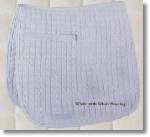
Contour Wither Relief Dressage Pad
$32.95
| |
|
Do You Have to Blanket Your Horse?
|
With fall upon us and winter close at its heels, one major decision facing many horse owners is whether to blanket their horse. In most cases, the answer is "no." As with many of our animals, we often put human feelings upon our four-legged friends – if we’re cold, they must be, too. Horses, though, are specially designed to generate energy and produce heat – a fact that can prove dangerous in the summer but incredibly beneficial in the winter.
Nature creates the horse’s own defense against the cold temperatures of winter. First, the horse begins to shed his summer coat in August, growing in a longer, thicker coat for the coming season. When temperatures really drop, the hairs of this winter coat may be “lifted” by the horse’s pilo-erector muscles, trapping an insulating layer of warmth between the skin and the hair. Additional insulation is also produced when the horse increases its food intake, gaining weight and storing fat. Even the horse’s tail helps to protect the vulnerable area between the hind legs that does not have as dense a hair growth. Oils and the fatty substance, sebum, which is secreted by glands attached to the hair follicles, create a natural barrier to help protect the horse from the rain. *
While many horse owners where the temperatures are much colder than ours keep their horses without blankets for the winter, there are situations that make it necessary to assist nature in defending the horse from the elements. Horses of advanced age or infirm conditions may not fair as well in protecting themselves from the cold weather, since their internal thermoregulating systems tend to fail them. These horses may require blanketing, as well as those whose coats have been clipped. Many horse owners opt to clip the long coat of a horse that will be worked frequently throughout the winter, either through training or shows. This allows the horse to cool off more quickly, without becoming chilled by the long, sweat-dampened hair. An alternative to clipping is to inhibit the growth of the winter coat by blanketing early. Regardless of the reason, you should blanket your horse if he is not going to have that longer, denser hair coverage provided by nature.
If you do opt to blanket your horse, make sure it is made of waterproof and breathable material, which will protect the horse from moisture both outside (rain) and inside (sweat). Either form of dampness, whether it is a rain-soaked or sweat-soaked blanket, will weight the hairs down and reduce the insulating ability of the horse's coat. If the horse has been clipped, then the moisture is directly against the horse’s skin. In either case, the horse may become chilled and, in turn, suffer from a respiratory illness. It is recommended to have a dry blanket handy to replace the soaked one (even the most waterproof blanket can become damp if it has been out in the rain for an extended time). Experts also suggest monitoring the blanketed horse by placing your hand beneath the blanket to check if the horse is too warm or damp from sweat. This is especially important during those months when the seasons are still changing and the temperatures can fluctuate radically.
Ultimately, in making your decision of whether you want to blanket your horse or not, you need to examine how often and for what purpose he will be worked during the fall and winter. Also, you will want to consider his age, health condition, and history (e.g., does he grow a sparse winter coat?). There is no right or wrong answer to the question of whether you want to blanket your horse – it is a matter of what is best for the horse under the conditions in which he will be living during those colder months.
*Despite this natural defense, it does not mean the horse is impervious to the winter conditions – rain and windy weather can disrupt the lay of the hair and the insulating layer that traps the warm air. For this reason, those horses that are kept outside should have some form of shelter, such as a run-in shed, from which they can protect themselves from those damaging elements.
|
|
|
|
|
|
|



